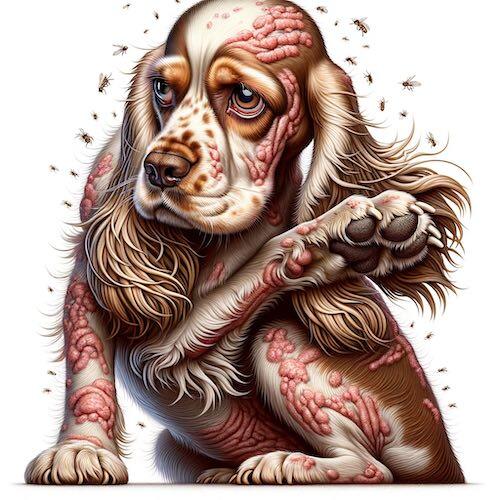Dog Allergy Symptoms: 5 Key Signs Your Dog Is Suffering
Introduction
Allergies in dogs are an increasingly common issue affecting their well-being. If your normally happy-go-lucky pup is showing signs of unexplained discomfort, it’s worth considering allergies as a possible cause. Learning to recognize the most telling symptoms is the first step towards getting your dog the help they need and restoring their playful spirit.
While allergies can be frustrating for both dogs and their owners, the good news is that they are often manageable. Identifying the underlying cause is crucial. Dogs can be allergic to various substances in their environment, such as pollen, dust mites, and mold spores. Food allergies, triggered by ingredients like beef, chicken, or certain grains, can also cause a range of reactions. Even flea bites can lead to severe allergic reactions in some dogs.
Search: Best Selling Dog Allergy Relief Treatment
Recognizing the signs is where your detective work begins. Typical dog allergy symptoms include itchy skin, respiratory troubles, digestive upset, and sometimes even changes in behavior. These symptoms can range from mild to severe, and knowing what to look for empowers you to consult your veterinarian promptly.
With proper diagnosis and a tailored management plan, most allergic dogs can enjoy a comfortable and happy life. Let’s delve into the five key signs that might indicate your dog is suffering from allergies and what you can do about it.
Understanding Dog Allergies
A dog’s immune system can become oversensitive to specific substances called allergens. This overreaction triggers the release of histamine and other chemicals, leading to the frustrating symptoms we see. Common allergens for dogs include:
- Environmental: Pollen, dust mites, mold spores
- Food: Certain proteins (beef, chicken, dairy) or grains
- Fleas: Allergic to flea saliva
5 Key Signs to Watch For
1. Skin Issues: The Hallmark Symptom
Skin problems are the most common and obvious sign of allergies in dogs. Here’s what to watch for:
- Intense itching, scratching, licking, and biting: This might be generalized or focused on specific areas like the paws, belly, or base of the tail. Excessive scratching can lead to open wounds and secondary infections.
- Redness, rashes, or recurring skin infections: Inflamed skin appears red or irritated and may have bumps, pimples, or hot spots. Dogs with allergies are prone to bacterial or yeast infections, adding to their misery.
- Hair loss or patches of dry, flaky skin: Constant scratching can damage hair follicles, leading to thin or bald patches. Dandruff and an overall unhealthy coat can also be signs of an allergic reaction.
2. Digestive Upset: Often Overlooked
While skin issues get the most attention, digestive problems are common in allergic dogs, especially with food allergies or sensitivities:
- Vomiting or diarrhea: These can range from occasional mild episodes to severe and frequent vomiting or diarrhea, which can be a sign of a serious allergic reaction.
- Increased flatulence or rumbling noises: Gas and changes in bowel sounds might indicate that your dog’s digestive system is struggling to process something.
- Disinterest in food or changes in appetite: Some dogs might refuse their regular food due to stomach upset, while others might start eating ravenously due to the inflammation allergies can cause.
3. Respiratory Problems: Mimic Other Conditions
Just like humans with hay fever, dogs can experience respiratory symptoms related to allergies:
- Frequent sneezing or a persistent runny nose: Sneezing is a common way for the body to expel irritants. A clear, watery nasal discharge might accompany these sneezes.
- Watery eyes or eye discharge: Inflammation around the eyes can make them appear teary or have a thick, sometimes yellow-colored discharge.
- Coughing, wheezing: Airway inflammation can lead to coughing and a wheezy sound with breathing. Severe cases might warrant urgent veterinary care, as it could indicate difficulty breathing.
4. Facial Swelling: A Possible Emergency
While less common, some dogs experience severe allergic reactions, causing noticeable swelling:
- Swelling of the muzzle, eyelids, or ears: This swelling can happen gradually or appear very suddenly. Pay close attention to any changes in your dog’s facial features.
- Hives or raised bumps on the skin: Hives are another sign of histamine release, appearing as itchy, raised welts that can occur anywhere on the body.
- Seek immediate veterinary attention if severe: Extreme swelling, particularly around the face, can hinder a dog’s breathing and is considered an emergency.
5. Behavioral and Overall Health Changes
The constant discomfort of allergies can affect a dog’s overall well-being and behavior:
- Lethargy or restlessness due to discomfort: A constantly itchy or nauseous dog is unlikely to be their usual playful self. They might seem lethargic or restless, unable to settle.
- Obsessive paw licking or chewing: Some dogs become fixated on licking or chewing their paws or other itchy areas in an attempt to get relief.
- Changes in coat appearance: Allergies can make a dog’s coat seem dull, greasy, or brittle. Excessive shedding might also occur.
Important Considerations:
-
Timing: The Key to Identifying Triggers Do symptoms worsen at certain times of the year (ex: springtime when pollen is high)? Do they flare up after eating a specific type of food, or perhaps after playing outside? Keeping a simple “symptom diary” where you make notes about when things seem worse can be incredibly valuable when discussing possible allergens with your vet.
-
Severity: When It’s More Than Just Itchiness: While mild itchiness might be manageable with home remedies like an oatmeal bath or wiping down paws after walks, more severe or unexplained symptoms always warrant a veterinary visit. This includes persistent vomiting and diarrhea, breathing difficulties, facial swelling, or any sudden change in your dog’s health or behavior. Early diagnosis is key to preventing complications.
-
Breed Predisposition: Genetics Play a Role: Certain breeds like Golden Retrievers, Bulldogs, Terriers, Boxers, and many others, have a genetic predisposition toward developing allergies. If you own one of these breeds, being extra mindful and proactive with your veterinarian about potential allergy triggers can prevent a lot of discomfort for your furry friend. However, it’s important to remember that any dog, regardless of breed, can develop allergies.
Additional Considerations
- Age of Onset: While allergies can appear at any age, young dogs seem to develop them more frequently. If your dog develops new, seemingly inexplicable symptoms, even if they aren’t a predisposed breed, allergies should be on the list of potential causes.
- Ruling Out Other Conditions: Some symptoms of allergies overlap with other canine health problems (parasites, infections). Your vet can help determine if allergies are the sole culprit or if there are underlying issues to address.
Getting Help for Your Allergic Dog
If you suspect allergies are behind your dog’s discomfort, a veterinary visit is the essential first step towards diagnosis and relief. Don’t be afraid to bring up allergies – even if the symptoms seem vague or mild. Your vet is the best person to determine the precise cause and rule out other possible health issues.
Here’s what you can expect during an allergy consultation:
- Detailed History: Your vet will ask questions about your dog’s symptoms, their onset, severity, and anything that seems to make them better or worse. A thorough medical history is crucial.
- Physical Exam: They’ll look for classic signs of allergies, inspect your dog’s skin, ears, etc., and check for secondary infections from scratching.
- Diagnostic Testing: If allergies are strongly suspected, various tests may be recommended. Skin prick or patch tests and blood tests (like IgE tests) can help narrow down specific allergens. If food allergies are suspected, a carefully monitored elimination diet might be necessary.
Treatment Options: Your Vet’s Recommendations
Based on the diagnosis, your vet will create an individualized treatment plan. This often involves a combination of these approaches:
- Allergen Avoidance: If specific environmental or food triggers are identified, your vet will provide advice on minimizing your dog’s exposure, such as frequent cleaning, air purifiers, or dietary changes.
- Medication:
- Antihistamines: Help block histamine release for milder allergies
- Steroids: For severe inflammation (short-term use)
- Allergy Immunotherapy: (“Allergy shots” to desensitize over time – long-term commitment)
- Specialized Diet:
- Hydrolyzed Protein: Uses broken-down proteins the immune system doesn’t recognize.
- Limited Ingredient Foods: For pinpointing food triggers.
- Topical Therapies:
- Medicated shampoos: Soothe inflamed skin, some fight secondary infections.
- Wipes or Sprays: Can provide targeted, itch relief between baths.
Product Recommendations: A Word of Caution
While many over-the-counter “allergy relief” products exist, it’s best to consult your vet before starting these. Here’s why:
- Masking Symptoms: Some products merely suppress symptoms without addressing the root cause, potentially prolonging your dog’s discomfort.
- Interaction Risk: Certain medications could have adverse interactions with veterinary prescribed treatments.
- The Importance of Diagnosis: The right treatment depends on the type of allergy; a product for environmental allergies won’t help if the issue is food.
Your vet can guide you on safe and effective options tailored to your dog’s specific needs once an allergy diagnosis has been made.
Price: $11.02 ($0.37 / Count)
6 used & new available from $11.02 ($0.37 / Count)
Price: $39.97 ($39.97 / Ounce)
2 used & new available from $39.97 ($39.97 / Ounce)
Amazon Brand - Wag Probiotic Supplement Chews for Dogs, Natural Duck Flavor, 90 count
Price: $21.40 ($0.24 / Count)
1 used & new available from $21.40 ($0.24 / Count)
Helping Your Dog Feel Better
Witnessing your dog suffer from allergies is heartbreaking. Seeing them constantly itch, battle tummy troubles, or struggle to breathe comfortably tugs at any pet owner’s heartstrings. But take heart – allergies don’t need to control your dog’s life! By being a keen observer of their symptoms, collaborating with your veterinarian to pinpoint the cause, and diligently implementing the right management plan, you can transform your dog’s well-being. It’s incredibly empowering to know that your actions can make a world of difference, restoring their playful spirit and zest for life.






